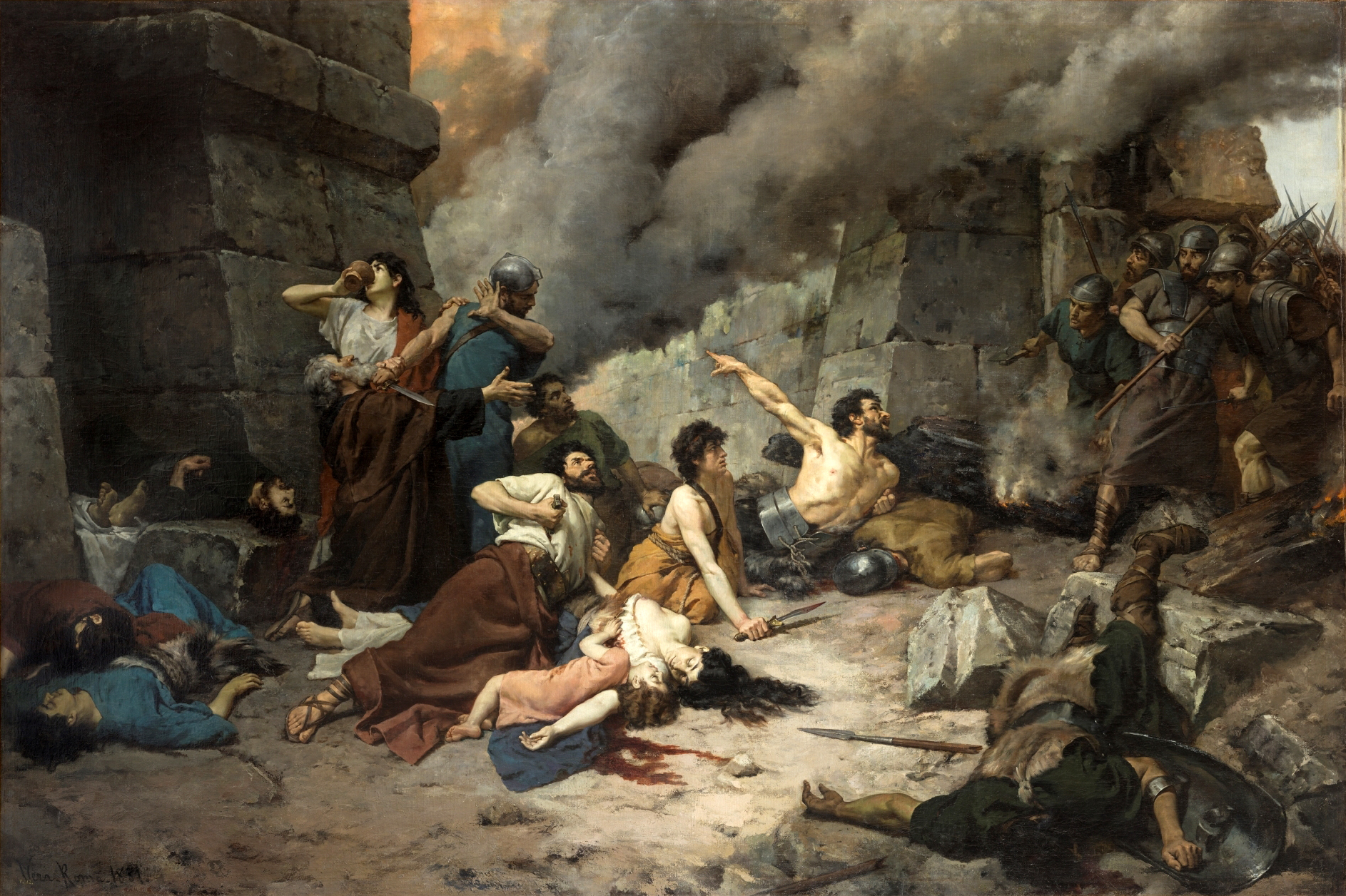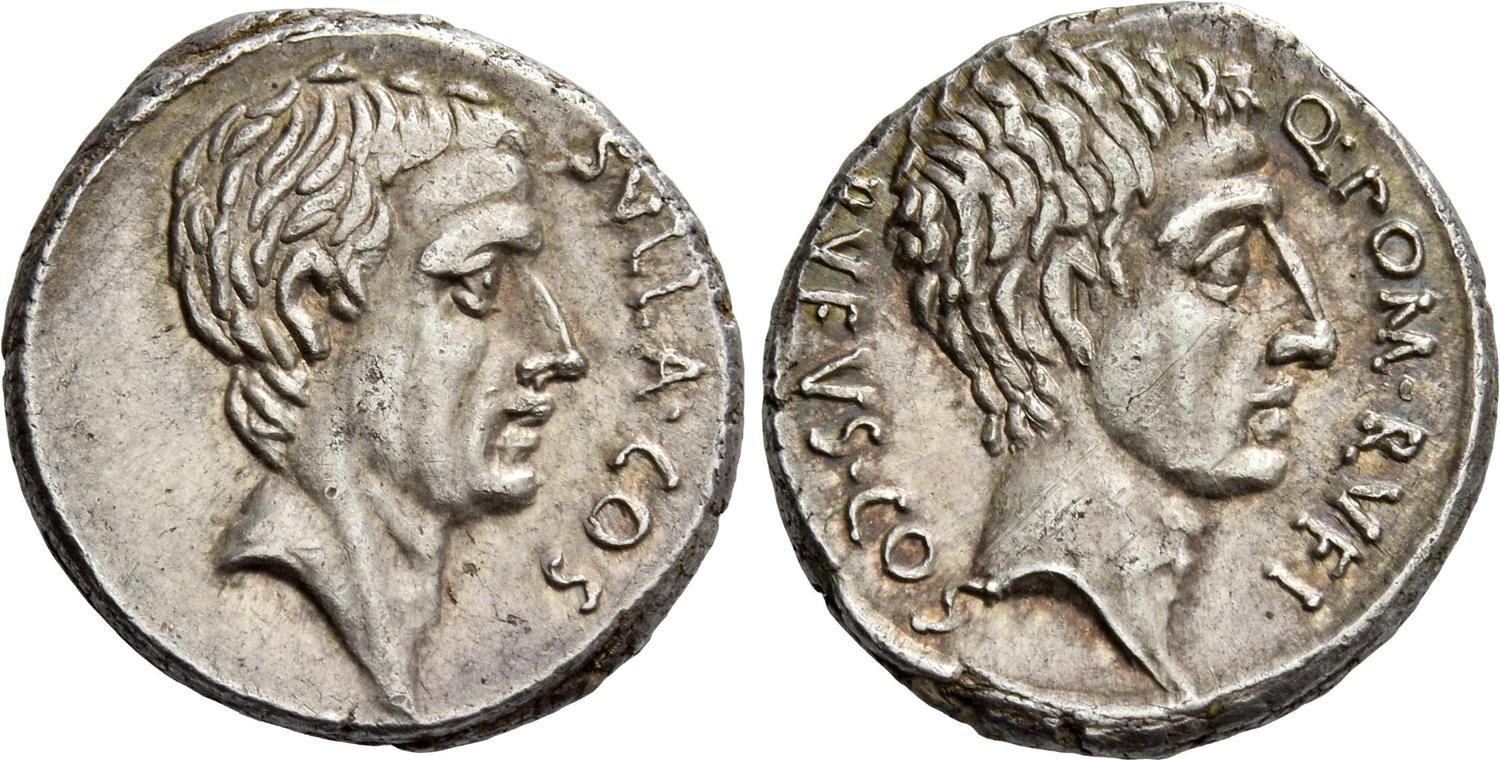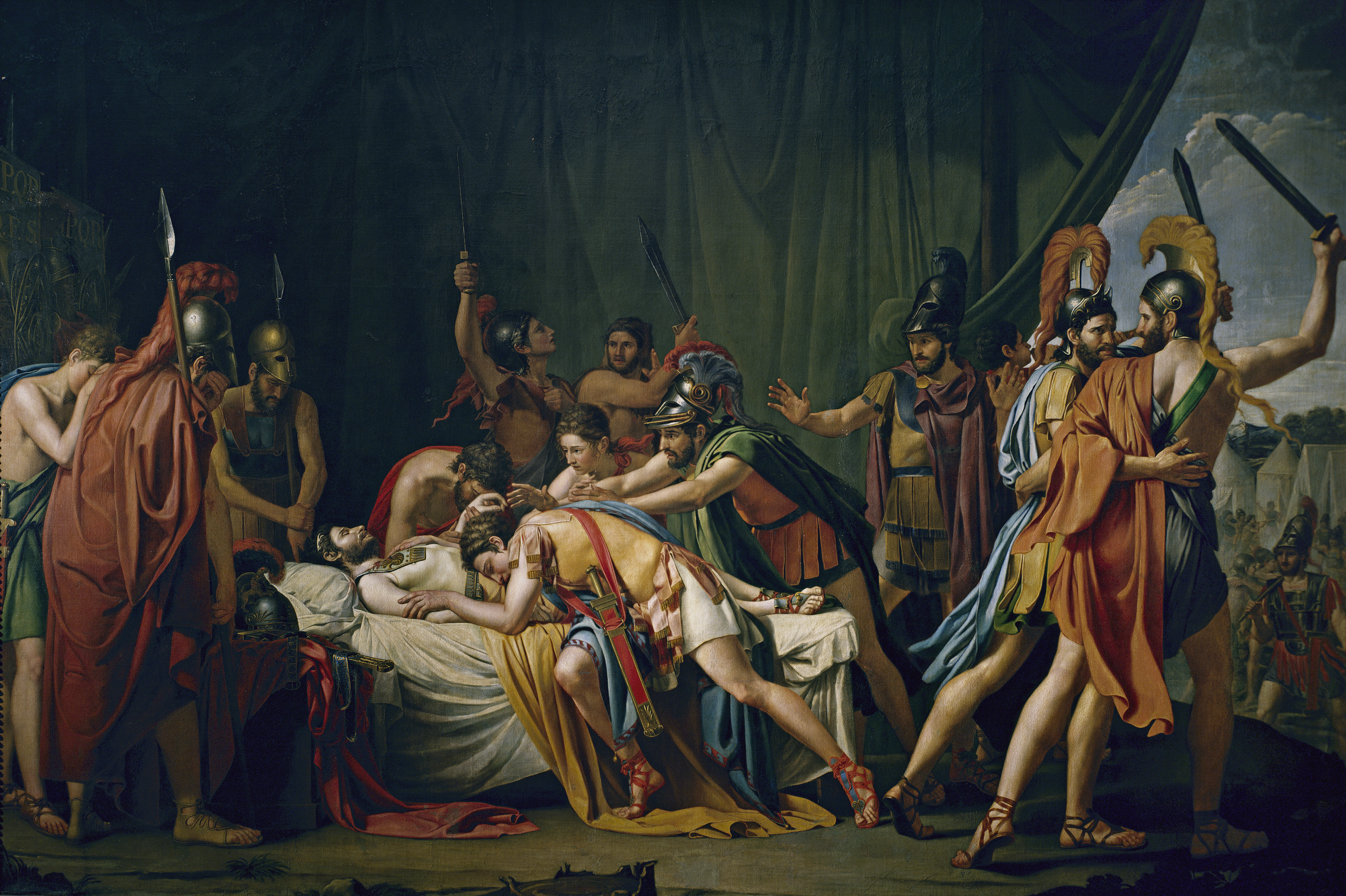|
Numantine War
The Numantine WarThe term Numantine War can refer to the whole conflict lasting from 154 to 133 or to just the latter part, from 143 to 133. Thus, the two conflicts are sometimes called the Numantine Wars (plural) and subdivided into the First and Second Numantine War. The two are also called the Second and Third Celtiberian (or Spanish) Wars. (from ''Bellum Numantinum'' in Appian's ''Roman History'') was the last conflict of the Celtiberian Wars fought by the Romans to subdue those people along the Ebro, in what is now Spain. It was a twenty-year conflict between the Celtiberian tribes of Hispania Citerior and the Roman government. It began in 154 BC as a revolt of the Celtiberians of Numantia on the Douro. The first phase of the war ended in 151, but in 143, war flared up again with a new insurrection in Numantia. The first war was fought contemporaneously with the Lusitanian War in Hispania Ulterior. The Lusitanians were subdued by Sulpicius Galba, who betrayed their sur ... [...More Info...] [...Related Items...] OR: [Wikipedia] [Google] [Baidu] |
Celtiberian Wars
The First Celtiberian War (181–179 BC) and Second Celtiberian War (154–151 BC) were two of the three major rebellions by the Celtiberians (a loose alliance of Celtic tribes living in east central Hispania, among which we can name the Pellendones, the Arevaci, the Lusones, the Titti and the Belli) against the presence of the Romans in Hispania. When the Second Punic War ended, the Carthaginians relinquished the control of its Hispanic territories to Rome. The Celtiberians shared a border with this new Roman province. They started to confront the Roman army acting in the areas around Celtiberia and this led to the First Celtiberian War. The Roman victory in this war and the peace treaties established by the Roman praetor Gracchus with several tribes led to 24 years of relative peace. In 154 BC, the Roman Senate objected to the Belli town of Segeda building a circuit of walls, and declared war. Thus, the Second Celtiberian War (154–152 BC) started. At least three tribe ... [...More Info...] [...Related Items...] OR: [Wikipedia] [Google] [Baidu] |
Ancient Rome
In modern historiography, ancient Rome is the Roman people, Roman civilisation from the founding of Rome, founding of the Italian city of Rome in the 8th century BC to the Fall of the Western Roman Empire, collapse of the Western Roman Empire in the 5th century AD. It encompasses the Roman Kingdom (753–509 BC), the Roman Republic (50927 BC), and the Roman Empire (27 BC476 AD) until the fall of the western empire. Ancient Rome began as an Italic peoples, Italic settlement, traditionally dated to 753 BC, beside the River Tiber in the Italian peninsula. The settlement grew into the city and polity of Rome, and came to control its neighbours through a combination of treaties and military strength. It eventually controlled the Italian Peninsula, assimilating the Greece, Greek culture of southern Italy (Magna Graecia) and the Etruscans, Etruscan culture, and then became the dominant power in the Mediterranean region and parts of Europe. At its hei ... [...More Info...] [...Related Items...] OR: [Wikipedia] [Google] [Baidu] |
Lucius Furius Philus
Lucius Furius Philus was a Roman statesman who became consul of ancient Rome in 136 BC. He was a member of the Scipionic Circle, and particularly close to Scipio Aemilianus. As proconsul, his allotted province was Spain. The consul of the previous year, Gaius Hostilius Mancinus, had recently suffered a humiliating defeat at the hands of the Numantines and was forced to surrender, an event known as the ''foedus Mancinum''. As his successor in Spain, it was Furius Philus who handed Mancinus over to the Numantines as recompense for the annulled treaty. Furius was remembered for deliberately picking two of his personal enemies, a 'Q. Metellus' and a 'Q. Pompeius', as lieutenants for his Spanish command, apparently so that his achievements could be lauded by even those who disliked him. For this, he was remembered either as an admirable model of Roman self-confidence or as an example of Roman rashness.Dio Cassius23.82/ref> He is mentioned by Macrobius as the author of a work mentio ... [...More Info...] [...Related Items...] OR: [Wikipedia] [Google] [Baidu] |
Tiberius Gracchus
Tiberius Sempronius Gracchus (; 163 – 133 BC) was a Roman politician best known for his agrarian reform law entailing the transfer of land from the Roman state and wealthy landowners to poorer citizens. He had also served in the Roman army, fighting in Africa during the Third Punic War and in Spain during the Numantine War. His political future was imperilled during his quaestorship when he was forced to negotiate a humiliating treaty with the Numantines after they had surrounded the army he was part of in Spain. Seeking to rebuild that future and reacting to a supposed decline in the Roman population which he blamed on rich families buying up Italian land, he carried a land reform bill against strong opposition by another tribune during his term as tribune of the plebs in 133 BC. To pass and protect his reforms, Tiberius unprecedentedly had the tribune who opposed his programme deposed from office, usurped the senate's prerogatives over foreign policy, and ... [...More Info...] [...Related Items...] OR: [Wikipedia] [Google] [Baidu] |
Roman Senate
The Roman Senate () was the highest and constituting assembly of ancient Rome and its aristocracy. With different powers throughout its existence it lasted from the first days of the city of Rome (traditionally founded in 753 BC) as the Senate of the Roman Kingdom, to the Senate of the Roman Republic and Senate of the Roman Empire and eventually the Byzantine Senate of the Eastern Roman Empire, existing well into the post-classical era and Middle Ages. During the days of the Roman Kingdom, the Senate was generally little more than an advisory council to the king. However, as Rome was an electoral monarchy, the Senate also elected new Roman kings. The last king of Rome, Lucius Tarquinius Superbus, was overthrown following a coup d'état led by Lucius Junius Brutus, who founded the Roman Republic. During the early Republic, the Senate was politically weak, while the various executive Roman magistrates who appointed the senators for life (or until expulsion by Roma ... [...More Info...] [...Related Items...] OR: [Wikipedia] [Google] [Baidu] |
Quintus Pompeius
Quintus Pompeius was the name of various Romans from the gens Pompeia, who were of plebeian status. They lived during the Roman Republic and Roman Empire. Consul of 141 BC Quintus Pompeius A. f. (flourished 2nd century BC) was the son of an Aulus Pompeius. Little is known of his early life and political career. The Roman Senator and Historian Cicero states that Pompeius first came to notice for his distinctive oratory. He was consul in 141 BC, during which, he was sent to Hispania as the successor of Quintus Caecilius Metellus Macedonicus in command of the Numantine War. Although he defeated Tanginus, after several defeats he and his troops were kept encamped before the walls of the town during the winter. With many soldiers dying from the weather and illness, Pompeius feared that the Roman Senate would summon him to Rome to answer to them for his conduct of the war. So Pompeius decided to make peace with the Numantines. Pompeius publicly demanded that the Numantines surrender ... [...More Info...] [...Related Items...] OR: [Wikipedia] [Google] [Baidu] |
Viriathus
Viriathus (also spelled Viriatus; known as Viriato in Portuguese language, Portuguese and Spanish language, Spanish; died 139 Anno Domini, BC) was the most important leader of the Lusitanians, Lusitanian people that resisted Roman Republic, Roman expansion into the regions of western Hispania (as the Romans called it) or western Iberia (as the Greeks called it), where the Roman province of Lusitania would be finally established after the conquest. Viriathus developed alliances with other Celtic groups, even far away from his usual theatres of war, inducing them to rebel against Rome. He led his army, supported by most of the Lusitanian and Vetton tribes as well as by other Celtic and Iberian allies, to several victories over the Romans between 147 BC and 139 BC before being betrayed by them and murdered while sleeping. Theodor Mommsen said of him: "It seemed as if, in that thoroughly prosaic age, one of the Homeric heroes had reappeared." Etymology There are several possible e ... [...More Info...] [...Related Items...] OR: [Wikipedia] [Google] [Baidu] |
Servius Sulpicius Galba (consul 144 BC)
Servius Sulpicius Galba was a consul of Rome in 144 BC. Macedonia Galba served as tribune of the soldiers for part of the second legion in Macedonia, under Lucius Aemilius Paullus Macedonicus. After the conquest of Perseus in 167 BC, following Aemilius' return to Rome, Galba attempted to prevent his triumph. Galba did not succeed, but his efforts created notoriety.Text copied verbatim from ''Dictionary of Greek and Roman Biography and Mythology'' Hispania Galba was a praetor in 151 BC. He was awarded Hispania (the Iberian Peninsula, including modern Spain and Portugal) as his province, where a war was being fought against the Celtiberians. When Galba arrived, he immediately confronted the Lusitanians. Galba successfully drove the enemy away, but he exhausted his undisciplined army and decided not to pursue the enemy. The Lusitanians turned around and a fierce battle ensued in which 7,000 Romans died. Galba then led the remnants of his army and his allies to his winter-quarters ... [...More Info...] [...Related Items...] OR: [Wikipedia] [Google] [Baidu] |
Lusitanians
The Lusitanians were an Indo-European languages, Indo-European-speaking people living in the far west of the Iberian Peninsula, in present-day central Portugal and Extremadura and Castilla y Leon of Spain. It is uncertain whether the Lusitanians were Celticized Iberians or Celts, related to the Lusones. After its conquest by the Roman Republic, Romans, the land was subsequently incorporated as a Roman province named after them (Lusitania). History Origins Frontinus mentions Lusitanian leader Viriathus as the leader of the Celtiberians, in their war against the Romans. The Greco-Roman historian Diodorus Siculus likened them to another List of ancient Celtic peoples and tribes, Celtic tribe: "Those who are called Lusitanians are the bravest of all similar to the Cimbri". The Lusitanians were also called Belitanians, according to the diviner Artemidorus. . [S.l.]: Real Academia de la Historia, 2000. 33 p. vol. 6 of Bibliotheca archaeologica hispana, v. 6 of Publicaciones del G ... [...More Info...] [...Related Items...] OR: [Wikipedia] [Google] [Baidu] |
Hispania Ulterior
Hispania Ulterior (English: "Further Hispania", or occasionally "Thither Hispania") was a Roman province located in Hispania (on the Iberian Peninsula) during the Roman Republic, roughly located in Baetica and in the Guadalquivir valley of modern Spain and extending to all of Lusitania (modern Portugal, Extremadura and a small part of Salamanca province) and Gallaecia (modern Northern Portugal and Galicia). Its capital was Corduba. Etymology ''Hispania'' is the Latin term given to the Iberian Peninsula. The term can be traced back to at least 200 BC when the term was used by the poet Quintus Ennius. The word is possibly derived from the Punic אי שפן ''I-Shaphan'' meaning "coast of hyraxes", in turn a misidentification on the part of Phoenician explorers of its numerous rabbits as hyraxes. Ulterior is the comparative form of ulter, which means "that is beyond". According to ancient historian Cassius Dio, the people of the region came from many different tribes. T ... [...More Info...] [...Related Items...] OR: [Wikipedia] [Google] [Baidu] |
Lusitanian War
The Lusitanian Wars, called ''Pyrinos Polemos'' ("the Fiery War") in Greek, were wars of resistance fought by the Lusitanian tribes of Hispania Ulterior against the advancing legions of the Roman Republic from 155 to 139 BC. The Lusitanians revolted in 155 BC, and again in 146 BC and were pacified. In 154 BC, a long war in Hispania Citerior, known as the Numantine War, was begun by the Celtiberians. It lasted until 133 and is an important event in the integration of what would become Portugal into the Roman and Latin-speaking world. Historical context In the sequence of the Second Punic War, the Roman Republic defeated Carthage and its colonies in the Mediterranean Coast of the Iberian Peninsula. This marked the first incursion of the Roman Republic into the peninsula and possibly the first clash between Lusitanians and Romans, as Lusitanian mercenaries fought on the Carthaginian side during the Punic Wars. In 194 BC, the Romans launched their first offensives in Lusitan ... [...More Info...] [...Related Items...] OR: [Wikipedia] [Google] [Baidu] |
Douro
The Douro (, , , ; ; ) is the largest river of the Iberian Peninsula by discharge. It rises near Duruelo de la Sierra in the Spanish Soria Province, province of Soria, meanders briefly south, then flows generally west through the northern part of the Meseta Central in Castile and León into northern Portugal. Its largest tributary (carrying more water than the Douro at their confluence) is the right-bank Esla (river), Esla. The Douro flows into the Atlantic Ocean at Porto, the second largest city of Portugal. The scenic Douro railway line runs close to the river. Adjacent areas produce port wine, port (a mildly fortification (wine), fortified wine) and other agricultural produce. A small tributary of the river has the Côa Valley Paleolithic Art site which is considered important to the archaeological pre-historic patrimony, designated a UNESCO World Heritage Site. Within Spain, it flows through the middle of the autonomous community of Castile and León, with the basin spanni ... [...More Info...] [...Related Items...] OR: [Wikipedia] [Google] [Baidu] |






